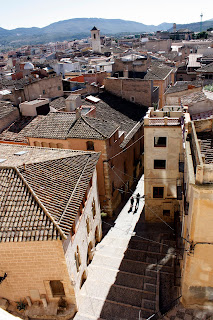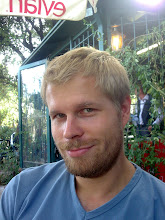After our short but sweet visit at Barcelona, we carried on westwards, towards the Basque country. Our first stop was the medieval village of Montblanc, which dates back to the 12th century. It's a pretty enough place, with rather impressively preserved city walls, with the rather nice cathedral probably being the touristy highlight of the place. After our short walk around the cobble-stoned streets, we decided to have some tapas for lunch on the pleasant main square, enjoying the sunshine on their terrace. The tapas were a bit disappointing compared to what we'd had in Barcelona the other day, but they did fill our stomachs.
From Montblanc, we carried on towards
our stop for the next night, Tarazona, crossing some pretty arid,
almost desert-like landscapes (and pretty deserted, as well).
Tarazona is another pretty little medieval town, although a bit
bigger than Montblanc. It has a rather glorious past, having been an
important town all the way back during Roman times, and also during
the Muslim era. We were rather impressed with our hotel, a very
tastefully reworked medieval palace (especially considering we only
paid something like 50 Euros for our room!). After checking in, we
had a walk around town, which was rather charming, with quite a few
impressive churches (unfortunately it was too late to visit any of
them). We finished our pleasant day with dinner in a very mundane
little dining establishment outside the town center. Kind of
indicative of the fact that Tarazona is a bit off the beaten path –
not really a tourist hot-spot.
After a rather filling and fancy buffet
breakfast, we hit the road again, heading towards the capital of
Navarra, Pampluna. Pamplona is of course famous for the running of
the bulls, which takes place in July (so we were out of luck,
then...). Our hotel was nicely located on the outskirts of the old
town, near the river Arga, which crosses Pampluna. After deposing our
bags, and parking our car, we set out to explore the old town. We
really liked Pampluna. It reminded us quite a lot of San Sebstian,
with its tidy, well-ordered streets, and well-preserved old houses.
But at the same time, it had that Spanish liveliness and business to
it. We had lunch in one of the many inviting eateries lining up the
streets near the picteresque Plaza del Castello. We enjoyed what I
would call excellent value for money – a three course meal with
unlimited wine and coffee for 18 Euros. Not bad, especially since the
food was excellent.
After lunch, we continued exploring the
old town, and also visited the famous cathedral. After the rather
mundane and uninsipiring exterior, we were most impressed with the
stunning interior. Especially the cloister, located behind the
cathedral, was really impressive. There was also a very nice modern
exhibition there, which examined the history of the cathedral and
Pampluna through the ages. Very nicely done indeed! We finished a
very nice day with dinner in another nice little restaurant near
Plaza del Castello. Again, we paid 18 Euros for a three course meal,
unlimited wine, and coffee (seems that there is some price-fixing
going on in Pampluna?). Not quite as nice as the place where we had
lunch, but still, excellent value for money for some pretty good
food. A nice way to end our short but most interesting visit.
The next day, we hit the road and made
our way for Bilbao, one of the main towns of the Basque country.
After confronting some rather menacing mist and some rain, we arrived
in a sunny Bilbao. After checking into our hotel, we headed out to
explore town straight away. We started by exploring the old town,
which isn't quite as big as the one in Pampluna, but equally
charming. The architecture is very basque, very simiar to what we saw
in the old town of San Sebastian (unsurprisingly). Plenty of
nice-looking pintxos (pintxos are Basque tapas) bars everywhere.
Having checked out the historic parts of Bilbao, we crossed the
Nervion river into the modern part of time. We stopped for lunch in
one of those charming pintxos places, and were very happy with our
choice. Excellent food – and amazing value (we paid something like
10 euros each for a very tasty and filling lunch).
We then made our way to what everybody
comes to see in Bilbao, the Guggenheim museum. I was kind of
expecting to be disappointed, but, surprise surprise, I was not. The
building really is amazing. It's probably, together with the Sydney
opera house, the most impressive modern building I've seen. And the
interior is equally amazing (as opposed to the Sydney opera house,
where the interior is quite disappointing) – I really like the
smooth and harmonious curves of the place (I don't think there is a
single straight angle in the place). The exhibitions were moderately
interesting, modern art is a bit hit and miss for me. But seeing the
interior of the building itself is worth the entry fee (which is
actually surprisingly low). Having checked out the museum, we made
our way back towards the old town, walking along the river. What
they've done by the river is very impressive too, with some very nice
bridges spanning the Nerion river. They complement the Guggenheim
museum very well.
After some further exploration of the
old town, we made our way back to the hotel, and got ready for
dinner. We selected a rather special venue for the night, called
Aizian. It's a proper gourmet restaurant located near the Guggenheim
museum, in a 5 star hotel. Proper fine dining – Michelin star
quality food and service, I would say. As a cherry on the cake, we
got to see the Guggenheim by night on the way back home.
All in all, we were very impressed with
Bilbao, I think they deserve all the tourists they get. Of course,
the main thing to see here is the Guggenheim museum, but even without
it, there is plenty of stuff to see. And that food is just amazing.
Anyway, time to hit the road again and head north towards France!











No comments:
Post a Comment